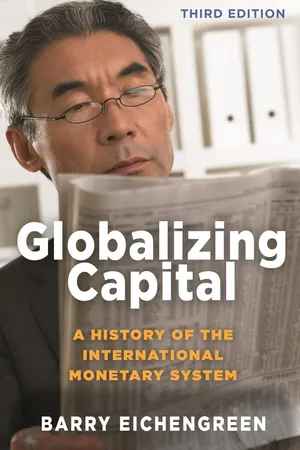
Globalizing Capital
A History of the International Monetary System - Third Edition
- 312 pages
- English
- PDF
- Available on iOS & Android
About this book
Essential reading for understanding the international economy—now thoroughly updated
Lucid, accessible, and provocative, and now thoroughly updated to cover recent events that have shaken the global economy, Globalizing Capital is an indispensable account of the past 150 years of international monetary and financial history—from the classical gold standard to today's post–Bretton Woods "nonsystem." Bringing the story up to the present, this third edition covers the global financial crisis, the Greek bailout, the Euro crisis, the rise of China as a global monetary power, the renewed controversy over the international role of the U.S. dollar, and the currency war. Concise and nontechnical, and with a proven appeal to general readers, students, and specialists alike, Globalizing Capital is a must-read for anyone who wants to understand where the international economy has been—and where it may be going.
Frequently asked questions
- Essential is ideal for learners and professionals who enjoy exploring a wide range of subjects. Access the Essential Library with 800,000+ trusted titles and best-sellers across business, personal growth, and the humanities. Includes unlimited reading time and Standard Read Aloud voice.
- Complete: Perfect for advanced learners and researchers needing full, unrestricted access. Unlock 1.4M+ books across hundreds of subjects, including academic and specialized titles. The Complete Plan also includes advanced features like Premium Read Aloud and Research Assistant.
Please note we cannot support devices running on iOS 13 and Android 7 or earlier. Learn more about using the app.
Information
Table of contents
- Cover Page
- Title Page
- Copyright Page
- CONTENTS
- Preface
- 1. Introduction
- 2 .The Gold Standard
- 3. Interwar Instability
- 4. The Bretton Woods System
- 5. After Bretton Woods
- 6. A Brave New Monetary World
- 7. A Decade of Crises
- 8. Conclusion
- Glossary
- References
- Index